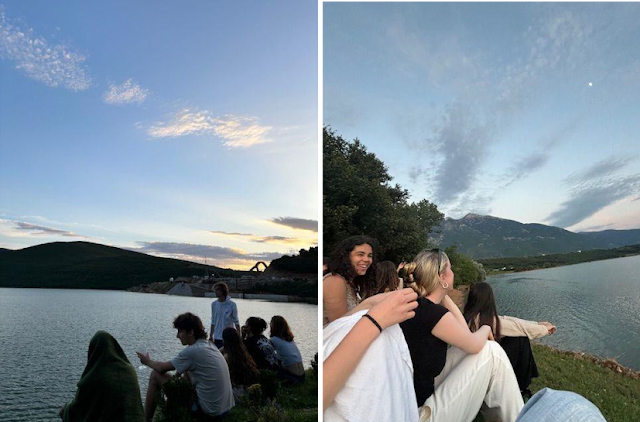By Novara Bazzi
At the time of writing, it has been a bit over a week since arriving back from our trip to Kosovo. It has been a good time to rest from the inspirational, yet intense days we had, reflect on what we have learned and experienced, and continue enjoying the amazing weather we brought back to Amsterdam from Pristina!
Besides the countless interesting and often moving meetings we were fortunate to attend with local organizations and governmental bodies in Kosovo, we also had significant freedom to work on our group projects related to peacebuilding in the country. I was lucky enough to collaborate with Lila, Leonor, and Laloue. As four music enthusiasts, we were eager to explore Kosovo’s music scene, with the belief that music is often seen as a uniting factor.
We drew inspiration from the 1997 U2 concert in Sarajevo. The band performed in a post-conflict society, and legend has it their music created a space where all ethnic communities came together, momentarily putting tensions to rest despite years of conflict. As frontman Bono said, "If there's any message, it's a simple one, a banal one: it's that music is beyond politics." We wondered, perhaps, the power of music extended to Kosovo, and could serve as a peacebuilding tool in its deeply divided society.
And so, we embarked on our musical journey in the country, initially holding the belief that music would undoubtedly play a significant role in the reconciliation and peacebuilding process of the post-conflict society we were trying to understand. In Pristina, we conducted brief interviews with people on the streets about their favorite music artists, and more in-depth discussions with Kosovar musicians about their experiences in the local music scene.
As we gathered various narratives, it became apparent that our initial assumption did not fully capture the diverse perspectives of the people of Kosovo regarding music in the context of peacebuilding. Music, we discovered, is multifaceted. For some, it could indeed serve as a unifying force between communities. For others, it was more about representing national identity, a source of division due to language barriers, or simply a form of enjoyment with no direct relationship to peacebuilding. Consequently, our project evolved over time. Instead of promoting a single narrative, we chose to encapsulate all the voices we heard. Each perspective was valuable and essential to genuinely and accurately represent the country, which became our ultimate goal.
This divide in narratives taught me a crucial lesson about Kosovar society: not every aspect of life is dictated by the conflict that occurred 25 years ago and the ongoing ethnic tensions. While it is essential to acknowledge and remember the events and grievances of the conflict, it is equally important to recognize that they do not wholly define Kosovo as a country.
During our interviews with locals, when we (indirectly) asked them to relate music to the ethnic divisions that persist, they were sometimes puzzled by our questions and struggled to make a direct connection. Some enjoyed talking to us about music and their experience in the music scene simply because they enjoy music, and not necessarily because it has a deeper meaning for them in the peacebuilding process of their country. Thus, while music can serve as a peacebuilding tool by fostering shared interests across communities, it does not always need to be framed within the context of conflict or divisions. Similarly, Kosovo should not be entirely defined by its past conflicts.
This realization began to take shape after we returned from Kosovo. Personally, I was still recovering from the stress of the previous semester and the intensive preparation week for Peace Lab before our departure. This made it challenging to fully absorb and reflect on everything I experienced and learned during my time in Kosovo.
Engaging with locals, attending meetings with local organizations, and interacting with governmental bodies were incredibly inspirational, but also quite overwhelming. It took a few days of rest after returning to fully grasp the trip's impact and understand what I had learned and how it had altered my perceptions. I am grateful to have had the final project to work on upon our return, as it provided an opportunity to synthesize my professional and personal insights and express my gratitude for this transformative trip—something I could not fully articulate while we were there. I am extremely happy to have our final product as a way of remembering Peace Lab 2024, and could not have done this without my amazing group!




No comments:
Post a Comment